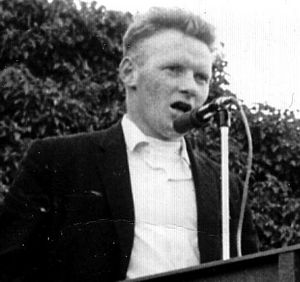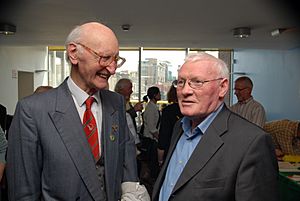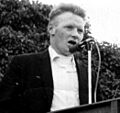Seán Garland facts for kids
Quick facts for kids
Seán Garland
|
|
|---|---|
 |
|
| General Secretary of the Workers' Party (Ireland) | |
| In office 1977–1990 |
|
| Preceded by | Máirín de Burca and Seán Ó Cionnaith (joint tenure) |
| Succeeded by | Des Geraghty |
| Personal details | |
| Born | 7 March 1934 Dublin, Ireland |
| Died | 13 December 2018 (aged 84) |
Seán Garland (born March 7, 1934 – died December 13, 2018) was an important Irish political leader. He served as the President of the Workers' Party in Ireland for many years, from 1977 to 1999. He was known for his long career in Irish politics and his efforts to bring about change.
Contents
Early Life and Beginnings
Seán Garland was born in Dublin, Ireland, in 1934. When he was 19, in 1953, he joined the Irish Republican Army (IRA). The IRA was a group that wanted to see a united Ireland.
In 1954, Seán briefly joined the British Army. He did this to gather secret information for the IRA. He collected details about a place called Gough Barracks in Armagh. This information helped the IRA carry out a successful operation there in June 1954. Seán left the British Army later that year and became a full-time training officer for the IRA.
In 1957, he was involved in an attack on a police barracks. During this event, two of his friends, Seán South and Fergal O'Hanlon, were badly hurt. Seán Garland tried to help his friend South, but sadly, both died. Seán himself was injured and spent time in Mountjoy Prison. While in prison, he even tried to become a politician in a local election, but he did not win. After being released, he was held again in a place called the Curragh before being set free in 1959.
After his release, Seán Garland continued his work with the IRA. He went to Belfast to connect with other members. He was arrested again and spent four years in Crumlin Road Gaol. While there, he became the leader of the IRA prisoners.
From Sinn Féin to the Workers' Party
In the 1960s, Seán Garland became interested in Marxism, which is a way of thinking about how society and the economy should be organized. He was one of several IRA leaders who wanted the group to move away from fighting and focus more on political action. He worked closely with other important figures like Cathal Goulding and Tomás MacGiolla.
Around 1969 and 1970, the IRA split into different groups. Seán Garland supported the idea of getting involved in regular politics. He became a key person in a group called Official Sinn Féin and also in the Official Irish Republican Army. The Official IRA announced a ceasefire (a stop to fighting) in May 1972.
In 1975, Seán Garland was injured in an attack while returning home with his wife. He recovered and continued his political work. In 1977, he was chosen as the general secretary of Official Sinn Féin. That same year, he suggested changing the party's name to Sinn Féin the Workers Party. Later, in 1982, he proposed dropping "Sinn Féin" from the name, making it simply the Workers' Party.
Seán Garland was also the Workers' Party representative at the National Forum on Europe. In 2000, he was elected president of the Workers' Party.
International Connections
In 1988, Seán Garland asked the KGB, which was the main security agency of the Soviet Union, for "special training" for some members of the Workers' Party. This request was made to help improve the party's security. The head of the KGB thought it was a good idea. However, the request was turned down by a higher committee. They were worried that if this cooperation became known, it could harm the relationship between the Soviet Union and the United Kingdom.
In 1999, there were reports that Seán Garland visited the North Korean embassy in Moscow. It was later suggested that this visit was connected to a scheme involving fake U.S. money. It was alleged that these fake notes were then brought to places like Dublin and Birmingham to be exchanged for real money. This situation was investigated by U.S. authorities in something they called "Operation Mali."
Fighting Extradition
On October 7, 2005, Seán Garland was arrested in Belfast. This happened because U.S. authorities wanted him to be sent to the United States (this is called extradition). They claimed he was involved in distributing fake U.S. dollars, sometimes called "superdollars," in several countries in 1998. They also suggested that these fake banknotes came from North Korea. Seán Garland was released on bail while the case was being decided.
A campaign was started to stop his extradition to the U.S. His supporters believed the U.S. waited for him to be in Northern Ireland because they thought the authorities there would be more likely to agree to the extradition than those in the Republic of Ireland.
In December 2005, a court in Belfast issued a warrant for his arrest because he did not appear for a hearing. However, in April 2006, Seán Garland was re-elected as President of The Workers' Party. He promised to fight the extradition attempt. In 2008, he decided to step down as president and was replaced by Mick Finnegan. Seán Garland remained an active member of the party.
He was arrested again in Dublin in 2009, and the U.S. request to extradite him was heard in court in 2011. Many people, including politicians and musicians, supported his fight against extradition. They pointed out that he was 77 years old and had serious health problems like diabetes and bowel cancer.
On December 21, 2011, a judge in the High Court in Ireland decided to reject the U.S. request for Seán Garland's extradition. The judge explained that the alleged offense was considered to have happened in the Republic of Ireland. This meant the court could not extradite him. Instead, the case was sent to the Director of Public Prosecutions to decide if he should be charged in Ireland.
In May 2012, Seán Garland spoke at the funeral of his friend and fellow party member, Noel Cullen. He spoke about Noel's passion and kindness.
Works
- Ireland and the Socialist Countries (1986)
- Cathal Goulding: Thinker, Socialist, Republican, Revolutionary, 1923 - 1998 (1999)
Images for kids




